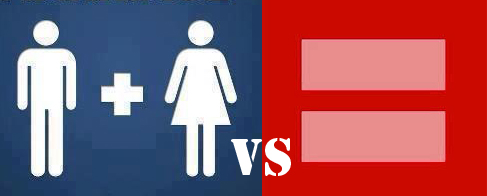
The United States Supreme Court is currently ruling on one of the most controversial cases of our time: the legalization of gay marriage.
In 2008, California passed Proposition 8, an amendment to their state constitution which allows only heterosexual marriages in the state. After multiple lawsuits were filed against Prop 8, the case was appealed to the Supreme Court in mid-2012, with oral arguments beginning on Mar. 26. The case, Hollingsworth v. Perry, will address issues such as the history of marriage, prejudice against gays and the effects of gay marriage on those children of the gay couple.
Proponents of gay marriage argue that the Constitution’s Equal Protection Clause in the Fourteenth Amendment should allow gay couples to marry. If the court decides in favor of this, it will allow those couples certain benefits, such as inheritance and taxation and the adoption of children to gay couples will go much more smoothly.
“It’s ridiculous that gay rights are even a controversial topic. Who people choose to share their affection with is strictly a personal affair. It wasn’t all that long ago that black rights were nonexistent, and it won’t be much longer before we realize that this is just another form of senseless oppression,” senior Greg Krause said.
The Defense of Marriage Act (DOMA) was passed in 1996 by former President Bill Clinton allowing states to choose to recognize same-sex marriage, but other states and the federal government do not have to recognize the marriage. Section 3 of the act restricts these couples from federal benefits, such as insurance from the government and filing joint tax returns. Along with Prop 8, the Supreme Court is ruling on the constitutionality of this act.
Those arguing against gay marriage say marriage is a religious institution, with the definition of marriage being between a man and a woman. They also say marriage is not a right, and gay marriage would not aid in procreation.
“I believe the institution of marriage should be between a man and a woman. Each gender has specific, integral qualities that are necessary in marriages and families,” senior McKinzie Davis said. “But I do not support discrimination, and I don’t harbor any ill will towards gay and lesbian couples.”
Both sides of the argument have been posted on social media outlets, such as Facebook and Twitter. Some have changed their profile pictures to a red equal sign with a red background, showing their support for gay marriage. Others changed their pictures to red crosses, equal signs with a line through it, or silhouettes of a man and a woman, symbolizing traditional marriage.
So far, the Supreme Court justices’ opinions and views have been scattered. Justice Samuel Alito said our information on gay marriage is scarce, saying it is “newer than cell phones or the Internet.” On the other side, Justice Sonia Sotomayor asked Charles Cooper, the attorney defending Prop 8, if they had any other reason, besides marriage, to deny homosexual couples certain benefits from the government. Cooper said he did not.
While personal and religious beliefs affect the way people feel about this issue, much of the drama over this case has to do with the politics behind it, specifically the constitutionality of Prop 8.
“Marriage is not a political nor a national issue,” senior Shane Frazier said. “States should decide whether or not they should legalize gay marriage. If people vote for it, then it is the general view of the people. Denying a vote on gay marriage is saying people don’t have this right.”
Experts do not expect a decision from the Supreme Court for quite a few months.

![Gazing up from the stage, junior Joseph McCurdy who played Peter Pan in the school play, Lost Girl, sits next to senior Juliana Rogers, who plays Wendy Darling, during a theater rehearsal. McCurdy’s passion for theater began when he observed a West High production in middle school. “I've been in the high school theater program since I was a freshman. I've always loved theater, but [what prompted me to join] was [when] I went to see [a performance here] when I was in middle school, and it was super cool,” McCurdy said.](https://pwestpathfinder.com/wp-content/uploads/2025/11/IMG_6535-1200x798.jpeg)

![Standing tall, stacked in a precise formation, the cheer team strikes a signature pose during halftime on Sept. 12 at the varsity football game. Nearly a month after this performance, the cheer team performed at the Missouri Cheerleading Coaches Association (MCCA) regional competition on Oct. 4, 2025. “We've all come [to] work together a lot more,” sophomore Elyssa Philippi said. “We're a lot closer than we were [earlier in the season] and going to state has made us closer [in] trying to work with each other, learn [new] skills and make our team better.”](https://pwestpathfinder.com/wp-content/uploads/2025/11/DSC5139-1.jpg)
![Handing out candy to excited trunk-or-treaters, President of the United Nations Children’s Fund club and junior Sara Ashok represents that group. Ashok was eager to participate in this event for multiple reasons. “I really wanted to be a part of the event because I get to help create memories for kids and spend time with my friends, spreading the things [I'm passionate about],” Ashok said.](https://pwestpathfinder.com/wp-content/uploads/2025/11/DSC_8648-1-1200x800.jpg)

![Smiling in a sea of Longhorns, Fox 2 reporter Ty Hawkins joins junior Darren Young during the morning Oct. 3 pep rally. The last time West was featured in this segment was 2011. “[I hope people see this and think] if you come to [Parkway] West, you will have the time of your life because there are so many fun activities to do that make it feel like you belong here. I was surprised so many people attended, but it was a lot of fun,” Young said.](https://pwestpathfinder.com/wp-content/uploads/2025/10/Edited2-1200x798.jpg)
![West High seniors and families listen as a representative of The Scholarship Foundation of St. Louis, Teresa Steinkamp, leads a Free Application for Federal Student Aid (FAFSA) workshop. This session, held in the library, provided guidance on financial aid, scholarships and student loan options. “This event is very beneficial for any seniors who are applying to or considering applying to colleges after high school [because] the cost of college is on the rise for seniors and parents,” college and career counselor Chris Lorenz said.](https://pwestpathfinder.com/wp-content/uploads/2025/09/DSC_4478-1200x778.jpg)
![Senior Kamori Berry walks across the field during halftime at the Homecoming football game on Sept. 12. During the pep assembly earlier that day, she was pronounced Homecoming Queen. “I thought it was nice that the crowd [started] cheering right away. I know [my friends] were really excited for me, and my family was happy because typically non-white people don't win,” Berry said.](https://pwestpathfinder.com/wp-content/uploads/2025/09/DSC7046-Enhanced-NR-1200x798.jpg)

